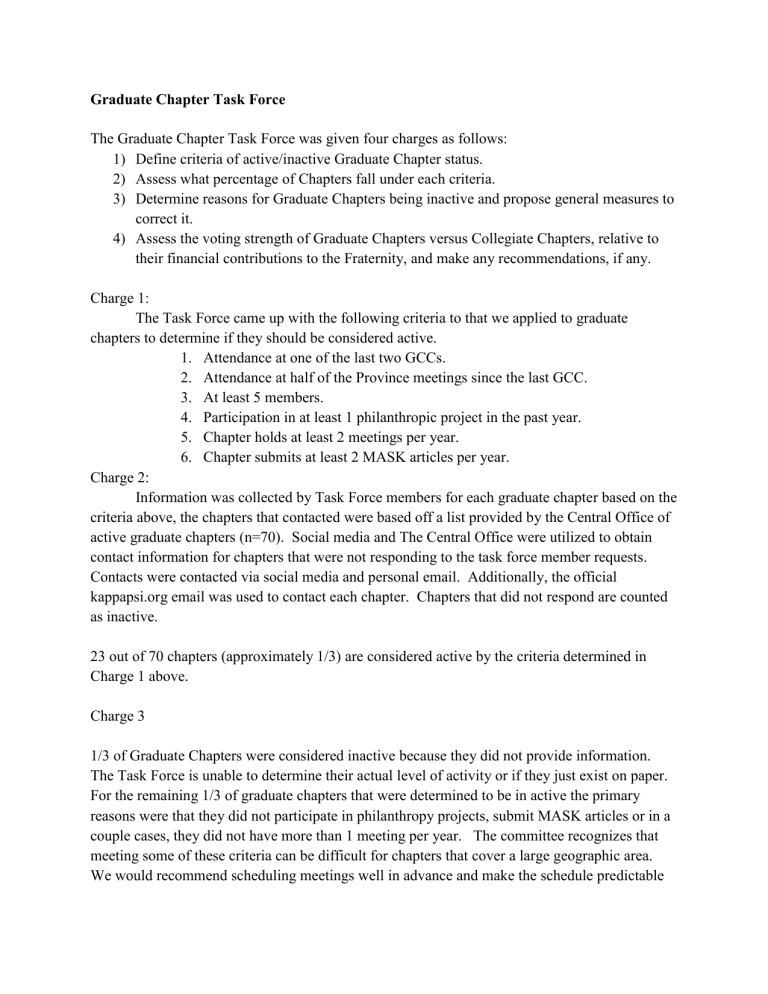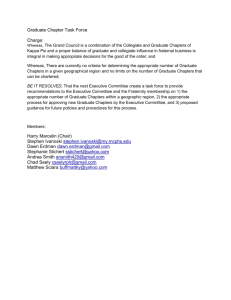Graduate Chapter Task Force Report

Graduate Chapter Task Force
The Graduate Chapter Task Force was given four charges as follows:
1) Define criteria of active/inactive Graduate Chapter status.
2) Assess what percentage of Chapters fall under each criteria.
3) Determine reasons for Graduate Chapters being inactive and propose general measures to correct it.
4) Assess the voting strength of Graduate Chapters versus Collegiate Chapters, relative to their financial contributions to the Fraternity, and make any recommendations, if any.
Charge 1:
The Task Force came up with the following criteria to that we applied to graduate chapters to determine if they should be considered active.
1.
Attendance at one of the last two GCCs.
2.
Attendance at half of the Province meetings since the last GCC.
3.
At least 5 members.
4.
Participation in at least 1 philanthropic project in the past year.
5.
Chapter holds at least 2 meetings per year.
6.
Chapter submits at least 2 MASK articles per year.
Charge 2:
Information was collected by Task Force members for each graduate chapter based on the criteria above, the chapters that contacted were based off a list provided by the Central Office of active graduate chapters (n=70). Social media and The Central Office were utilized to obtain contact information for chapters that were not responding to the task force member requests.
Contacts were contacted via social media and personal email. Additionally, the official kappapsi.org email was used to contact each chapter. Chapters that did not respond are counted as inactive.
23 out of 70 chapters (approximately 1/3) are considered active by the criteria determined in
Charge 1 above.
Charge 3
1/3 of Graduate Chapters were considered inactive because they did not provide information.
The Task Force is unable to determine their actual level of activity or if they just exist on paper.
For the remaining 1/3 of graduate chapters that were determined to be in active the primary reasons were that they did not participate in philanthropy projects, submit MASK articles or in a couple cases, they did not have more than 1 meeting per year. The committee recognizes that meeting some of these criteria can be difficult for chapters that cover a large geographic area.
We would recommend scheduling meetings well in advance and make the schedule predictable
and combine events together if possible. For example an annual meeting between the winter holidays that incorporates a food drive or toy drive. Make a meeting an annual tradition; if you work closely with a collegiate chapter, you could always have a meeting after a certain rush event, or always after graduation in order to do the graduation ritual.
Brothers can be members of more than one graduate chapter and it is hard to be active in a graduate chapter that you are not physically near. The Task Force was divided on the idea of requiring a brother to declare a primary graduate chapter that they can hold office in and then just being a member of other graduate chapters. There are a few brothers in the fraternity that are able to pull off being active in multiple graduate chapters and we do not want to discourage brothers being active. The Task Force believes that there should be a clear process of when a chapter gets inactivated due to non-payment of dues. 61 graduate chapters paid dues in 2013, 34 in 2014 and the Task Force was given a list of 70 active graduate chapters in 2014. There is a disconnect there. The Task Force also agrees that some of the criteria above should be used to determine if a chapter is active or not. With that we do agree that we need to keep graduates active in the fraternity and that restricting too severely the number of graduate chapters or offices within graduate chapters that a brother can be active in could hinder graduate participation.
Task 4:
Dues account for ~90% of the fraternity revenue.
2013
$257,344 – Total dues collected
$31,272 – Graduate chapter dues (61 chapters), voluntary national dues and additional donations
~12% of revenue from Graduate chapters/graduates
2014
$253,267 – Total dues collected
$19,676 – Graduate chapter dues (34 chapters), voluntary national dues and additional donations
~7% of revenue from Graduate chapters/graduates
Voting strength:
Based on 107 collegiate chapters and 70 graduate chapters
Collegiate Chapters – 57% of votes but contribute 90% of dues
Graduate Chapters – 38% of votes but contribute 10% of dues
The committee could not agree on any specific recommendations to rectify this inequality. But if there was a clear process for what is an active graduate chapter and a clear expectation of what is
expected of a graduate chapter, then some chapters might not be able to meet the standard and would be forced to become inactive, which would help rectify the inequality.
Respectfully Submitted
Graduate Chapter Task Force
John Pietkiewicz- Chair




